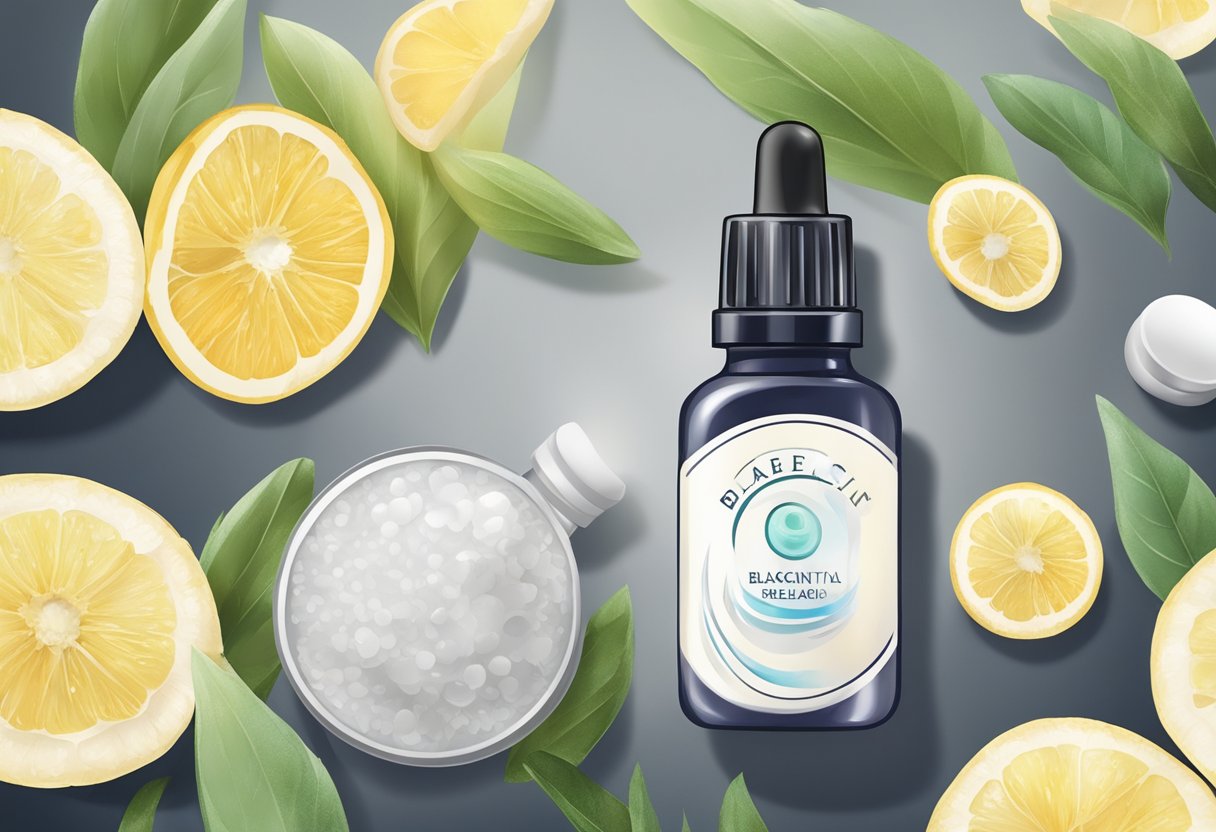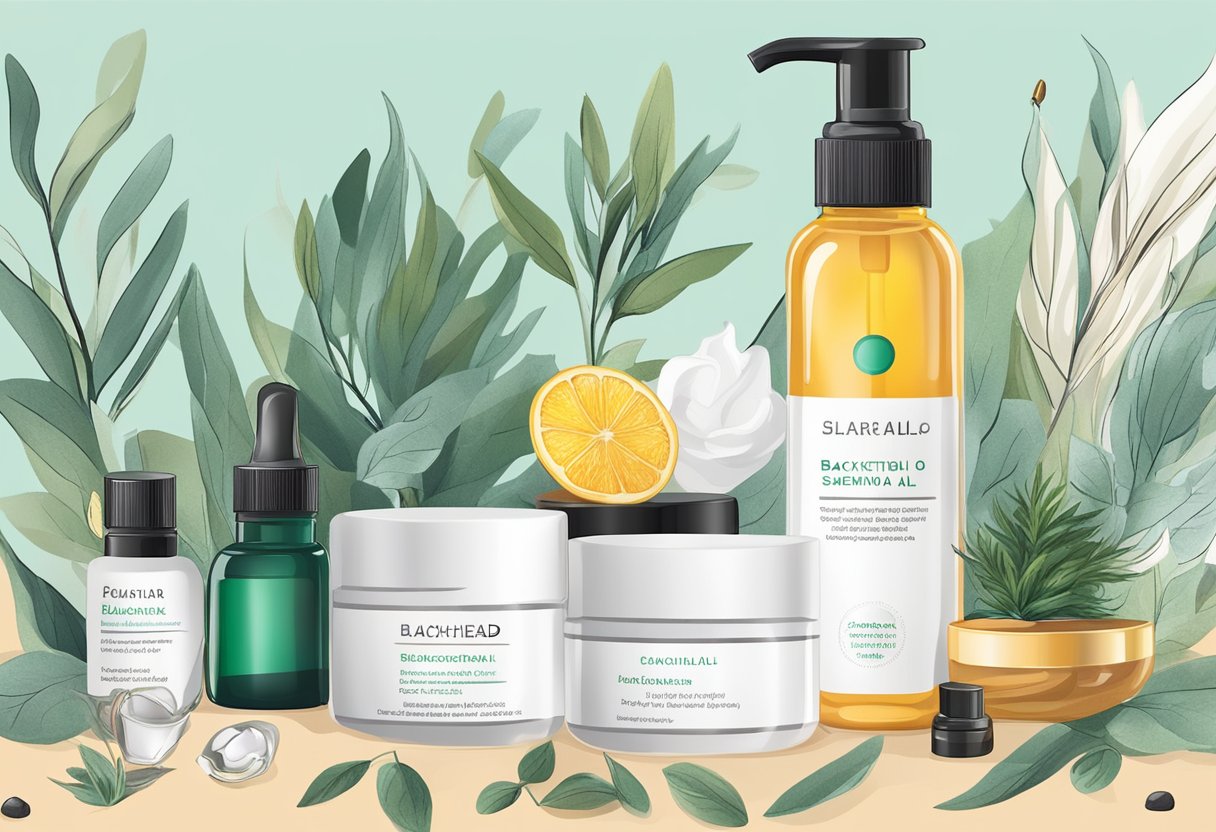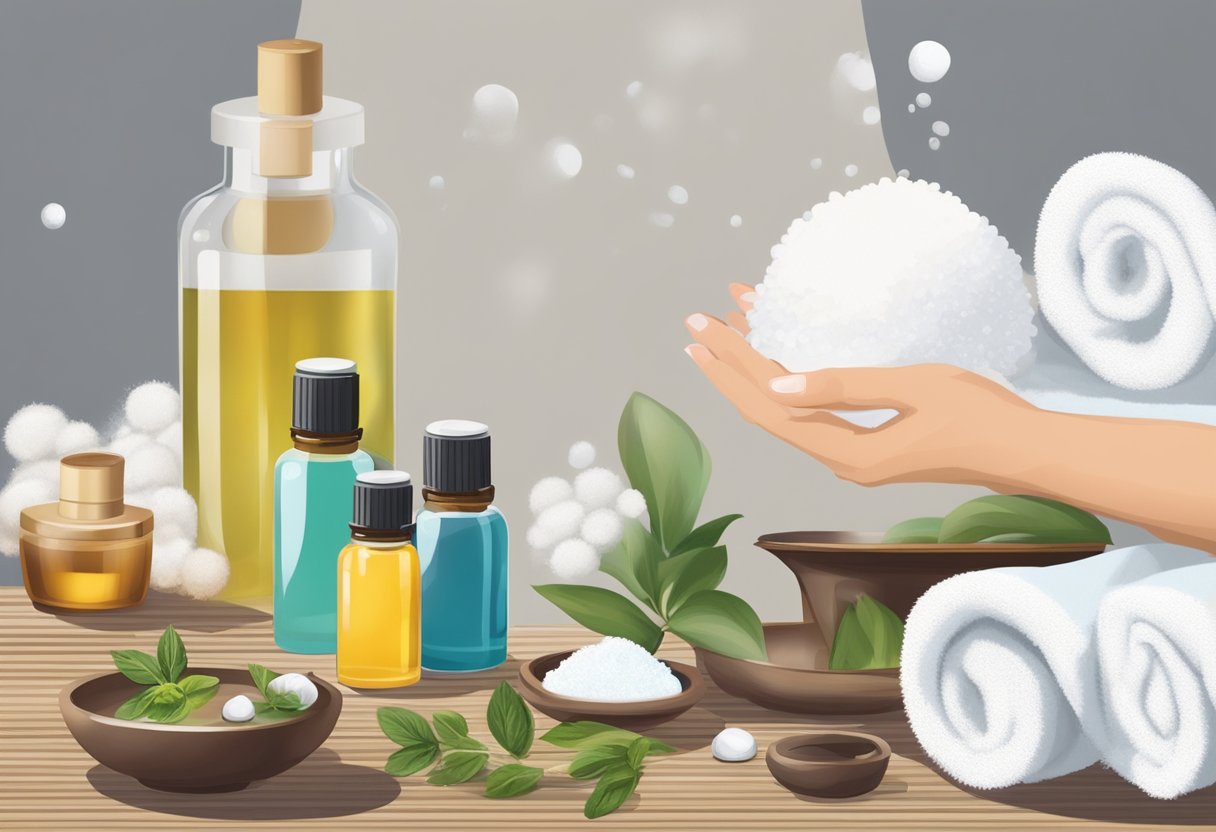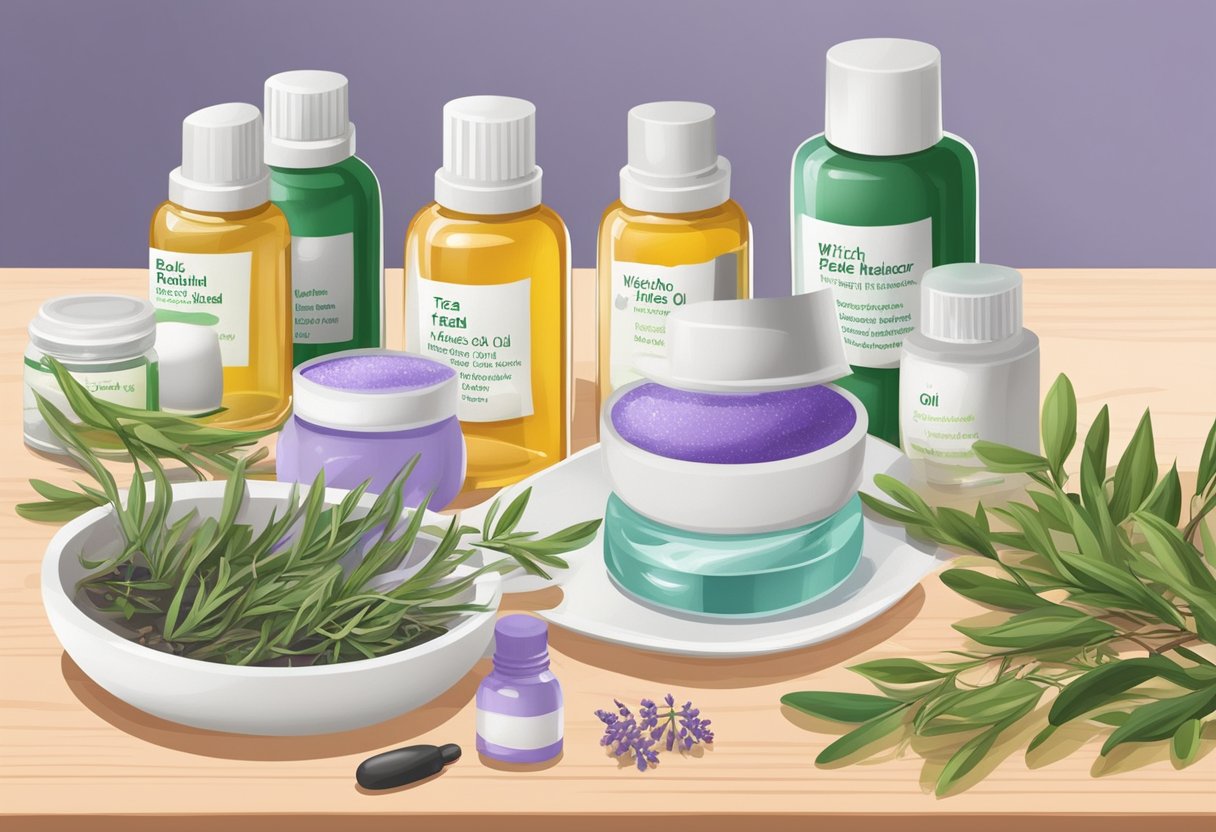Blackheads are a common skin problem that affects people of all ages. They are caused by the accumulation of oil and dead skin cells in the pores of the skin. While there are many over-the-counter products that claim to get rid of blackheads, some people prefer to use natural remedies such as essential oils.

Essential oils are concentrated plant extracts that can be used for a variety of purposes, including skincare. Some essential oils have antibacterial and anti-inflammatory properties that can help to unclog pores and reduce the appearance of blackheads. However, it’s important to note that not all essential oils are safe for use on the skin, and some may even cause irritation or allergic reactions.
If you’re looking for natural ways to get rid of blackheads, it’s important to do your research and choose essential oils that are safe and effective. In this article, we’ll explore some of the best essential oils for getting rid of blackheads, as well as tips for using them safely and effectively.
Understanding Blackheads

Blackheads are a common type of acne that affects many people, especially those with oily skin. They are small, dark-colored bumps that appear on the skin, usually on the face, neck, chest, and back. Blackheads form when the pores become clogged with excess oil, dead skin cells, and other impurities. When the clogged pores are exposed to air, they turn black, giving the blackheads their characteristic appearance.
Blackheads are not harmful, but they can be unsightly and make the skin look dull and uneven. They can also be difficult to get rid of, especially if they are deep-seated or numerous. While there are many over-the-counter and prescription treatments available for blackheads, some people prefer to use natural remedies, such as essential oils.
Essential oils are concentrated plant extracts that are known for their therapeutic properties. They are often used in aromatherapy, massage, and skincare products. Essential oils can be effective in treating blackheads because they have antimicrobial, anti-inflammatory, and astringent properties that can help to unclog the pores, reduce inflammation, and tighten the skin.
Here are some of the best essential oils for getting rid of blackheads and their properties:
| Essential Oil | Properties |
|---|---|
| Tea Tree Oil | Antimicrobial, anti-inflammatory, and astringent |
| Lavender Oil | Antimicrobial, anti-inflammatory, and soothing |
| Peppermint Oil | Antimicrobial, anti-inflammatory, and cooling |
| Eucalyptus Oil | Antimicrobial, anti-inflammatory, and refreshing |
| Lemon Oil | Antimicrobial, astringent, and brightening |
It is important to note that essential oils should always be diluted with a carrier oil or other base before use, as they can be irritating to the skin if used undiluted. It is also recommended to do a patch test before using any new essential oil to check for any allergic reactions or sensitivity.
In addition to using essential oils, it is important to maintain a regular skincare routine that includes cleansing, exfoliating, and moisturizing. Eating a healthy diet, getting enough sleep, and managing stress can also help to prevent blackheads from forming.
Benefits of Essential Oils for Skin

Essential oils are concentrated plant extracts that have been used for centuries for their therapeutic properties. They have been found to be beneficial for the skin due to their anti-inflammatory, antimicrobial, and antioxidant properties.
Some of the benefits of using essential oils for the skin include:
-
Reducing inflammation: Essential oils such as chamomile, lavender, and tea tree oil have anti-inflammatory properties that can help reduce redness, swelling, and irritation on the skin.
-
Fighting bacteria: Essential oils such as tea tree oil, peppermint oil, and eucalyptus oil have antimicrobial properties that can help kill bacteria on the skin, which can prevent blackheads and other types of acne.
-
Moisturizing the skin: Essential oils such as jojoba oil, rosehip oil, and argan oil have moisturizing properties that can help hydrate the skin and prevent dryness.
-
Improving skin tone: Essential oils such as frankincense, geranium, and rose oil have antioxidant properties that can help improve skin tone and reduce the appearance of fine lines and wrinkles.
-
Unclogging pores: Essential oils such as tea tree oil, lavender oil, and lemon oil have astringent properties that can help unclog pores and prevent blackheads.
Overall, essential oils can be a great addition to your skincare routine if used properly. It is important to dilute them with a carrier oil and patch test them before applying them to your skin, as some people may have allergic reactions to certain essential oils.
Top Essential Oils for Blackheads

When it comes to getting rid of blackheads, essential oils can be a great natural solution. Here are some of the best essential oils for blackheads:
Tea Tree Oil
Tea tree oil is a popular choice for treating blackheads due to its antibacterial and anti-inflammatory properties. It helps to unclog pores and reduce inflammation, which can lead to a clearer complexion. To use tea tree oil, mix a few drops with a carrier oil (such as jojoba or coconut oil) and apply to the affected area.
Lavender Oil
Lavender oil is another essential oil that can help with blackheads. It has anti-inflammatory and antiseptic properties that can help to reduce inflammation and prevent infection. To use lavender oil, mix a few drops with a carrier oil and apply to the affected area.
Rosemary Oil
Rosemary oil is a natural astringent that can help to tighten and tone the skin. It also has antibacterial properties that can help to prevent infection and reduce inflammation. To use rosemary oil, mix a few drops with a carrier oil and apply to the affected area.
Eucalyptus Oil
Eucalyptus oil is known for its cleansing properties, which makes it a great choice for treating blackheads. It can help to unclog pores and reduce inflammation, which can lead to clearer skin. To use eucalyptus oil, mix a few drops with a carrier oil and apply to the affected area.
Lemongrass Oil
Lemongrass oil is a natural astringent that can help to tighten and tone the skin. It also has antibacterial properties that can help to prevent infection and reduce inflammation. To use lemongrass oil, mix a few drops with a carrier oil and apply to the affected area.
Overall, essential oils can be a great natural solution for treating blackheads. When using essential oils, it is important to dilute them with a carrier oil and perform a patch test before applying to the entire affected area.
How to Use Essential Oils Safely

When using essential oils, it is important to follow proper safety guidelines to avoid any adverse effects. Here are some key points to keep in mind:
Dilution Guidelines
Essential oils are highly concentrated and should always be diluted before use. The dilution ratio depends on the oil and the intended use. For example, a 1% dilution (1 drop of essential oil per 1 teaspoon of carrier oil) is appropriate for facial use, while a 2-5% dilution is recommended for body massage.
Patch Testing
Patch testing is an important step to take before using any new essential oil. Apply a small amount of the diluted oil to a patch of skin on the inside of the elbow or behind the ear. Wait 24 hours to see if any redness, itching, or irritation occurs. If so, do not use the oil.
Application Techniques
There are several ways to apply essential oils, including inhalation, topical application, and ingestion. Inhalation is the safest method and can be done by adding a few drops of oil to a diffuser or inhaling directly from the bottle. Topical application should always be done with a carrier oil to avoid skin irritation. Ingestion is not recommended unless under the guidance of a qualified healthcare practitioner.
By following these safety guidelines, individuals can safely and effectively use essential oils to get rid of blackheads and enjoy their many benefits.
Essential Oil Blends for Blackhead Removal

Using essential oils for blackhead removal is an effective and natural way to get rid of these pesky skin blemishes. Here are some essential oil blends that can help:
1. Tea Tree and Lavender Oil Blend
Tea tree oil is a powerful anti-inflammatory and antibacterial agent that can help reduce inflammation and kill bacteria on the skin. Lavender oil has soothing properties that can help calm irritated skin. Together, these oils can help reduce the appearance of blackheads and prevent new ones from forming.
To use this blend, mix 3-4 drops of tea tree oil with 3-4 drops of lavender oil and apply it to the affected areas of the skin. Leave it on for 10-15 minutes before rinsing it off with warm water.
2. Jojoba and Frankincense Oil Blend
Jojoba oil is a natural moisturizer that can help keep the skin hydrated and prevent the overproduction of sebum, which can lead to blackheads. Frankincense oil has astringent properties that can help tighten the pores and reduce the appearance of blackheads.
To use this blend, mix 2-3 drops of jojoba oil with 2-3 drops of frankincense oil and apply it to the affected areas of the skin. Massage it in gently for a few minutes before rinsing it off with warm water.
3. Lemon and Bergamot Oil Blend
Lemon oil has antibacterial properties that can help kill the bacteria that cause blackheads. Bergamot oil has astringent properties that can help tighten the pores and reduce the appearance of blackheads.
To use this blend, mix 2-3 drops of lemon oil with 2-3 drops of bergamot oil and apply it to the affected areas of the skin. Leave it on for 10-15 minutes before rinsing it off with warm water.
When using essential oils for blackhead removal, it is important to dilute them with a carrier oil such as jojoba oil or coconut oil to prevent skin irritation. It is also important to do a patch test before using any new essential oil blend on your skin to make sure you are not allergic to it.
Precautions and Side Effects

While essential oils can be beneficial for getting rid of blackheads, it is important to take precautions and be aware of possible side effects. Here are some things to keep in mind:
-
Essential oils should always be diluted before use, as they can be very potent and irritating to the skin if applied undiluted. A general rule of thumb is to use no more than 3-5 drops of essential oil per 1 ounce of carrier oil.
-
Some essential oils can be phototoxic, meaning they can cause skin to become more sensitive to sunlight and increase the risk of sunburn or skin damage. These oils include citrus oils like lemon, lime, and bergamot. It is best to avoid using these oils on the skin before going out in the sun.
-
Essential oils should never be ingested, as they can be toxic if taken internally.
-
If you have sensitive skin or are prone to allergies, it is important to patch test any new essential oils before using them on your face. Apply a small amount to the inside of your wrist and wait 24 hours to see if any irritation or redness occurs.
-
Pregnant women and children should consult with a healthcare professional before using essential oils, as some oils can be harmful or cause adverse reactions.
-
If you experience any adverse reactions or side effects from using essential oils, such as redness, itching, or swelling, stop using them immediately and seek medical attention if necessary.
By taking these precautions and being aware of possible side effects, you can safely and effectively use essential oils to get rid of blackheads and improve the overall health and appearance of your skin.
Alternatives to Essential Oils for Blackheads

While essential oils can be helpful in treating blackheads, there are other alternatives available as well. Here are some other options to consider:
Salicylic Acid
Salicylic acid is a common ingredient in many over-the-counter acne treatments. It works by exfoliating the skin and unclogging pores. It can be found in face washes, toners, and spot treatments. Salicylic acid is particularly effective for treating blackheads on oily skin.
Benzoyl Peroxide
Benzoyl peroxide is another common ingredient in acne treatments. It works by killing the bacteria that cause acne and reducing inflammation. Benzoyl peroxide can be found in face washes, spot treatments, and moisturizers. It is particularly effective for treating blackheads on dry skin.
Retinoids
Retinoids are a type of vitamin A that can help improve the overall appearance of the skin. They work by increasing cell turnover and reducing the production of oil. Retinoids can be found in prescription creams and gels. They are particularly effective for treating blackheads on aging skin.
Charcoal
Charcoal is a natural ingredient that can help absorb excess oil and unclog pores. It can be found in face masks and cleansers. Charcoal is particularly effective for treating blackheads on all skin types.
Clay
Clay is another natural ingredient that can help absorb excess oil and unclog pores. It can be found in face masks and cleansers. Clay is particularly effective for treating blackheads on oily skin.
By incorporating these alternatives into your skincare routine, you can help reduce the appearance of blackheads and improve the overall health of your skin.
Frequently Asked Questions

Which essential oils are effective for both pimples and blackheads?
Tea tree oil and lavender oil are two essential oils that are effective in treating both pimples and blackheads. They have antibacterial and anti-inflammatory properties that help to reduce inflammation and prevent the formation of new pimples and blackheads.
What is the correct method to apply tea tree oil for blackhead treatment?
Tea tree oil should be diluted with a carrier oil such as jojoba oil or coconut oil before applying it to the skin. A ratio of one drop of tea tree oil to three drops of carrier oil is recommended. The mixture can be applied to the affected area with a cotton swab or ball. It is important to avoid using too much tea tree oil, as it can cause skin irritation.
Can jojoba oil help in the removal of blackheads, and if so, how should it be used?
Jojoba oil can help to remove blackheads by moisturizing the skin and preventing the buildup of excess oil. It can be used as a carrier oil for other essential oils or on its own. To use jojoba oil for blackhead removal, apply a small amount to the affected area and massage it into the skin. Leave it on for a few minutes before rinsing it off with warm water.
What are the best practices for using essential oils to treat acne?
When using essential oils to treat acne, it is important to dilute them with a carrier oil and perform a patch test before applying them to the skin. Essential oils should not be applied directly to the skin, as they can cause irritation and sensitivity. It is also important to use high-quality, pure essential oils and to avoid using too much of them.
Are there essential oils that can help dissolve blackheads and reduce the appearance of dark spots?
Lemon oil and frankincense oil are two essential oils that can help to dissolve blackheads and reduce the appearance of dark spots. Lemon oil has astringent properties that can help to tighten pores and reduce the buildup of oil and dirt. Frankincense oil has anti-inflammatory properties that can help to reduce redness and inflammation associated with acne. However, it is important to dilute these oils with a carrier oil before applying them to the skin.
